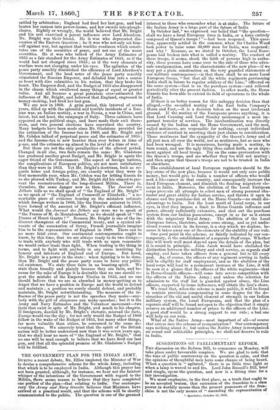THE GOVERNMENT PLAN FOR THE INDIAN ARMY. DURING a recent
debate, Mr, Ellice implored the Minister of War to devise a comprehensive scheme for the whole Army, including that which is to be employed in India. Although this prayer has not been granted, although, for instance, we hear not the faintest whisper of the intentions of the Government with regard to the Militia, there seems reason to believe that they have completed one portion of the plan—that relating to India. • Our contempo- rary the Army and Navy Gazette believes that Ministers have arrived at a practical result, and that the scheme will be shortly communicated to the public. The question is one of the greatest
interest to those who remember what is at stake. The future of the Indian Army is a large part of the future of India.
In October last,* we expressed our belief that "the question— shall we have a local European force in India, or a force entirely composed of Queen's troops ? "—had been reopened. This ques- tion, apparently settled in the summer, when Sir Charles Wood took power to raise some 30,000 men for India, was reopened ; and why ? Because, as we stated in October, the Local Euro- peans had broken into what is called a mutiny. The conduct of these troops, it seems, shook the faith of persons high in autho- rity, these persons have come over to the side of those who advo- cate amalgamation, and the characteristic of the new plan—if we may put a plain construction on the very guarded statements of our military contemporary--is that there shall be no more Local European troops, " but that all the white regiments garrisoning India shall in future be regular soldiers of the Line," officered on the same system—that is on the purchase system—and relieved periodically after the present fashion. In other words, the Horse Guards has been able to extend its field of operations to the whole of India.
If there is no better reason for this unhappy decision than that alleged,—the so-called mutiny of the East India Company's Horse and Foot,—it is a decision taken on the most irrelevant ground. If the mutiny of the Europeans proves anything, it is that Lord Canning and Lord Stanley mismanaged a most im- portant transfer of services. The insubordination was directly caused by the Indian and the Home Government, and the men, called mutineers, are responsible for nothing, except individual violence of conduct in asserting their just claims to consideration. Those mutineers had the sympathy of the Queen's Army and of alljust men all over the world, not as mutineers, but as men who had been wronged. It is monstrous, having made a mutiny, to turn round, and use the ugly thing thus called forth, as an argu- ment against all local troops. Try on the same provocation with the Queen's troops, and see whether they too will not mutiny ; and then argue that Queen's troops are not to be trusted in India or elsewhere.
The establishment of local European regiments should be the key-stone of the new plan, because it would not only save public money, but would give to India a number of officers who would seek a life-career in that country, and consequently increase the fixed European element, and diminish the floating migratory ele- ment in India. Moreover, the abolition of the Local European corps prevents all attempts to select men of strong personal cha- racter and great ability for Indian service, and throws it open to chance and the purchase-list at the Horse Guards—no small dis- advantage to India. Not the least merit of Local corps, in our eyes, is that they impose a limit to Horse Guards influence and power, already sufficiently extensive, and shut out the purchase system from our Indian possessions, except in so far as it enters with the migratory Royal Army. The abolition of the Local European forces, therefore, unless some strong, and as yet undis- closed reason exist in its favour, is a step which we deplore, be- cause it takes away one of the elements of the stability of our rule. One good point in the scheme, as faintly indicated by our con- temporary, is the establishment of a separate Staff corps. Whether this will work well must depend upon the details of the plan, but it is sound in principle. John Jacob would have abolished the distinction between the military and civil service, as regards staff employ, and have taken officers from a general list to fill every post. As, of course, the officers of any regiment serving in India will be eligible for staff employment, and as the abolition of the local corps will lead to a permanent increase of the Line, it will be seen at a glance that the officers of the white regiments—that is Horse-Guards officers—will come into severe competition with the officers of the Native Army ; and unless the selection for admission to the staff list is guarded against abuse, the Line officers, supported by home influences, will obtain the lion's share. We trust that, when the scheme is made public, it will be found to contain provisions compensating in some degree for the de- struction of the old and useful element of strength in our Indian military system, the Local Europeans, and that the plan of a separate staff will be found not open to the objection that it simply secures an additional number of prizes to the officers of the Line. A good staff would be a strong support to our rule ; a bad one will help on our ruin. What of the Native Army—most important of all—of course that enters into the scheme of reorganization? Our contemporary says nothing about it ; but unless the Native Army is reorganized on sound and soldierlike principles, we shall not deserve to rule in India.


























 Previous page
Previous page